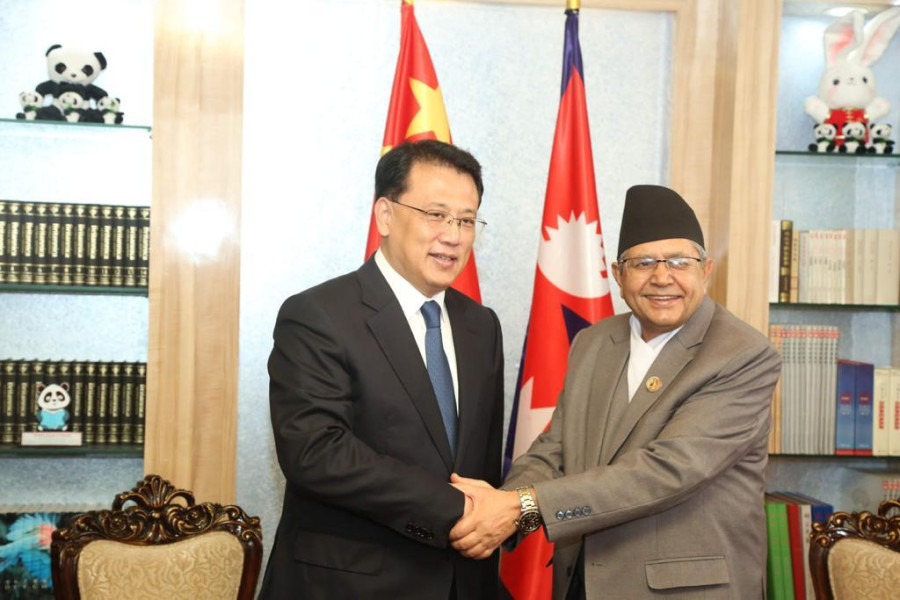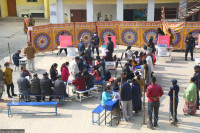National
China pledges Rs145 million aid for Nepal’s seven provinces
The money will be used for agriculture-related projects aimed at poverty alleviation.
Anil Giri
The visiting Chinese delegation led by Yuan Jiajun, a politburo member of the Communist Party of China, has pledged Rs145 million (eight million yuan) to carry out various agriculture-related projects in all seven provinces of Nepal.
The projects will be funded through the China-South Asian Countries Poverty Alleviation and Cooperative Development Centre, headquartered in Chongqing, China.
Yuan, who is tipped as a future leader of China, however, did not discuss BRI projects in Nepal during his meeting with party leaders.
The Rs145 million aid was announced through a statement issued after Yuan’s meeting with Speaker Devraj Ghimire on Monday. The Chinese delegation landed in Nepal on a three-day visit on Sunday.
Yuan arrived in Nepal after visiting Sri Lanka. He told Nepali leaders that he came to Nepal at the instruction of Chinese President Xi Jinping.
But Monday’s statement made no mention of the BRI, much to the surprise of Nepali officials. In recent times, China has tended to lump even non-BRI projects in Nepal like the new Pokhara airport under Xi’s signature foreign policy initiative.
“China is interested in alleviating poverty in South Asia through small projects. This signals a shift in its priorities and suggests Nepal is its priority country as well,” a senior Maoist Centre leader who interacted with Yuan told the Post.
“The aid announced on Monday will cover 1,500 households in each of the seven provinces.”
The leader also said that the projects will emphasise agriculture, livestock training, and focus on horticulture and all these initiatives will be part of a pilot programme.
Besides some large projects, the Chinese are also investing in small and micro projects in Nepal to lift the livelihood of the Nepali people, said Dev Gurung, general secretary of the CPN (Maoist Center).
Just last week Chinese officials launched the “Silk Roadster” concept in Nepal that also focuses on micro projects and programmes. Chinese leaders said the Silk Roadster is a new concept brought to Nepal to mark the tenth anniversary of the proposition of the BRI by Chinese President Xi Jinping. Nepal signed the framework agreement on the BRI in 2017.
Silk Roadster is a new platform for practical cooperation and people-to-people exchanges between China and Southeast and South Asian countries, according to the plan’s concept paper issued at the launch.
Similarly, during his meeting with Deputy Prime Minister and Minister for Defense, Purna Bahadur Khadka, the politburo member of the Chinese Communist Party said that Nepal and China can work together in the areas like agriculture, food security, industrial development, employment generation, urbanisation, physical infrastructure, expansion of bilateral trade, development of culture and trade, and youth exchange, among others.
“This is our effort to make Nepal self-reliant on food and agriculture products,” Yuan told Speaker Ghimire on the new projects.
Ghimire and Yuan also jointly launched a Chinese language lab at the LRI School in Kalanki, Kathmandu.
On Monday morning, Yuan visited Kubhinde village in Sindhupalchok district and launched the China-South Asian Countries Poverty Alleviation and Cooperative Development Centre “Vibrant Village” Model Project.
Former Chinese foreign minister Wang Yi, who is now the director of the Office of the Foreign Affairs Commission of the Communist Party of China, had first announced the establishment of China-South Asian Countries Poverty Alleviation and Cooperative Development Centre at a Covid-19 related conference of foreign ministers of China, Afghanistan, Bangladesh, Nepal, Pakistan and Sri Lanka in April 2021.
Some experts called the meeting and establishment of the center China’s bid to form the “Himalayan Quad”, a counter-initiative of the Quad bloc comprising India, US, Japan and Australia.
The centre aims to pool strength, integrate resources, and exchange wisdom to support and help the South Asian countries' economic development and livelihood improvement, jointly promoting the cause of poverty reduction, according to the statement issued by the Chinese foreign ministry after the establishment of the centre. Former Nepali ambassador to China Mahendra Bahadur Pandey had attended the conference on Nepal’s behalf.
On Sunday, the Chinese delegation met several party leaders and held virtual talks with Prime Minister Pushpa Kamal Dahal, who is currently in Italy. The delegation also met with a team of leaders of the CPN (Maoist Centre) the same evening and discussed several issues related to mutual interest and concern, according to the Maoist Centre leaders.
Yuan also met Nepali Congress chief and former prime minister Sher Bahadur Deuba and will call on CPN-UML chair KP Oli on Tuesday before wrapping up his three-day Nepal visit.
Speaker Ghimire told the Chinese leader that high-level visits from China showed the significance attached by the northern neighbour to Nepal, his secretariat said in a statement issued following the meeting.
“Continuous high-level visits have been taking place following the visit by Chinese President Xi Jinping in 2019. I acknowledge such bilateral visits will help in Nepal’s development and prosperity,” said Ghimire.
Saying that Nepal is gradually becoming politically stable and achieving economic growth after the promulgation of the constitution, the Speaker underscored the importance of implementation of the bilateral transit treaty and Rasuwagadhi-Kerung railway. Speaker Ghimire also said that Nepal’s tourism industry was benefitting from increasing flow of Chinese tourists.
Leading a 26-member delegation, Yuan arrived in Kathmandu on Sunday on a three-day visit to Nepal at the invitation of the Ministry of Foreign Affairs. He paid a courtesy call on President Ramchandra Paudel and also held a virtual meeting with Prime Minister Pushpa Kamal Dahal, who is on a week-long visit to Italy.
The LRI school function was attended by several leaders from the Congress, the UML, the Maoist Centre, and the Rastriya Swatantra Party.




 27.48°C Kathmandu
27.48°C Kathmandu














